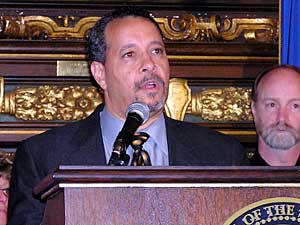|
Audio
Photos
More from MPR
Resources
Your Voice
|
Drivers may return soon, but what about bus riders?
April 14, 2004
Metro Transit buses could be back on the streets this weekend, if striking drivers approve a new contract. However, many former riders might not be back, at least not right away. Transit officials worry that the strike will lead to a decrease in ridership -- just as it did following the last transit strike in 1995. Some say the strikes weaken people's confidence in the system. Now, the challenge for transit officials is to get riders back.
St. Paul, Minn. — Following the bus strike of 1995, Metro Transit ridership dropped 3 percent. It took more than a year for those figures to rebound. This year's strike was nearly twice as long as the last. Met Council chairman Peter Bell acknowleges the challenge facing the bus system.
"We frankly think ridership -- there'll be a further decline in that. We're in unchartered waters. We don't know how long it will take to build that back up. It's very, very important for us to do that," Bell says.
The council will allocate $500,000 to a public relations campaign to encourage post-strike ridership. In 1995, Metro Transit tried to lure customers back by offering free rides. Metro Transit officials say they haven't yet decided how they will use the money for the marketing campaign.
At least one Twin Cities advertising executive suggests an approach that targets specific bus routes.
"I wouldn't do any mass media, and I would do guerrilla tactics -- three or four blocks on either side of a bus route," says Lee Lynch, CEO of Carmichael Lynch advertising agency.
|
The people who have that car sitting in the garage that they have been riding in. ... They've slipped back into the habit of having their own car. You've lost another rider and you've created more congestion.
- Lee Lynch, advertising executive |
By "guerrilla tactics," Lynch means direct mailing or distributing coupons for free bus rides near bus routes that are most likely to suffer from the strike. Those routes are located in areas where people are more likely to have gone back to driving their cars.
"The people who have that car sitting in the garage that they have been riding in. They've exercised that car, they've gotten it out, they've slipped back into the habit of having their own car," says Lynch. "You've lost another rider and you've created more congestion."
Those people are more likely to lose confidence in the bus system, says Lea Schuster, head of Transit for Livable Communities -- an advocacy group that encourages people to use alternatives to cars.
Schuster says it will probably take more than free rides to increase bus ridership. Transit needs more support from the Legislature, says Schuster. She says budget cutbacks have led to service cuts and fare increases.
"Unless and until the governor can really provide leadership to come up with a new source of funding for transit -- that makes transit more stable, more reliable -- I think we're going to have a lot of people who doubt whether our transit system is going to work for them," Schuster says.
Regardless of fare increases or service decreases, there will always be people dependent on the buses, says Schuster. And they will be the first ones back on the buses this weekend. Carmen Weston-Rose is among them. So, how did she use the buses?
"Visiting. Doctor. Just to get downtown. Shopping. Everything. So I'll be really glad for them to start up again," she says.
Weston-Rose is pushing her bike up Penn Avenue in north Minneapolis. Weston-Rose is unemployed and disabled. She says she rode her bike a little bit before the strike, but had to rely on it as her sole mode of transportation during the strike. Weston-Rose says she knows people who car-pooled during the strike. She says she hopes the strike has taught them a lesson.
"I just hope that they keep their same car pools so they don't get in that same position again," she says.
Metro Transit estimates that 75,000 people ride more than 700 buses each day in the metro area. Many of those riders will be looking forward to getting back into their pre-strike routine. Metro Transit officials will no doubt be paying close attention to how many of them make it back on board.
|
News Headlines
|
Related Subjects
|

